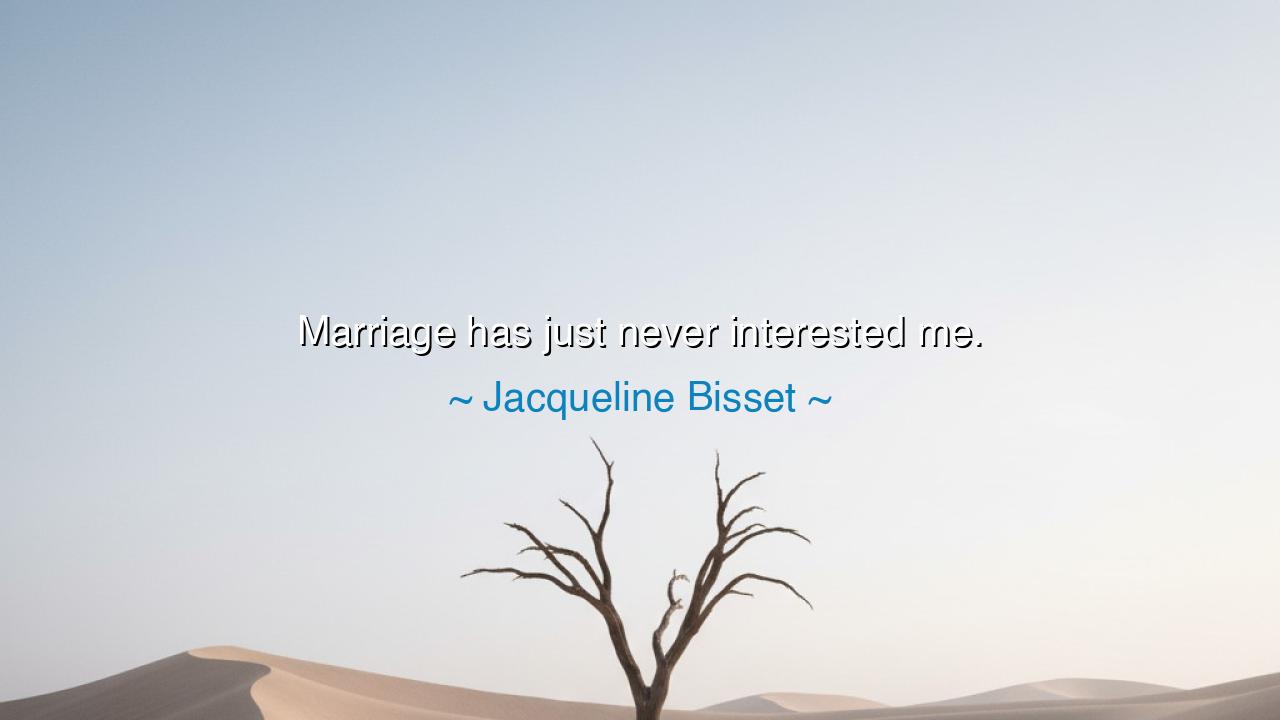
Marriage has just never interested me.






In the tapestry of human life, marriage has long been revered as the cornerstone of society, a union that holds profound significance both for the individual and for the larger community. Yet, Jacqueline Bisset speaks with clarity and conviction when she says, “Marriage has just never interested me.” These words reveal an important truth: that the institution of marriage, for all its societal reverence, is not a universal aspiration. Some, like Bisset, find their purpose, their fulfillment, and their identity outside the conventional paths laid before them. Marriage, while often regarded as a sacred bond, may not be the essential cornerstone of happiness or self-actualization for all individuals.
The ancients, too, wrestled with the tension between individual fulfillment and the prescribed norms of society. In the Greek city-state of Athens, the ideal of marriage was closely tied to procreation and the continuation of family legacy, yet it was not without its complexities. Figures like Aristotle argued that marriage was essential to the moral and social fabric of society, for it was through the family that the virtues of duty and responsibility were instilled in citizens. Yet, even Aristotle recognized that individuals might find purpose in other ways. The great philosopher Diogenes famously lived a life of asceticism and rejection of societal norms, including marriage, in his quest to live authentically. His life was dedicated to self-sufficiency and the pursuit of wisdom, unconcerned with the conventional bonds that society placed on him. Bisset’s reflection, in many ways, aligns with the ancient philosophers who chose to live by their own values and principles, rather than submitting to external expectations.
Consider the story of Cassandra, the tragic figure from Greek mythology. Though she was beloved by the gods and blessed with the gift of prophecy, her refusal to marry Apollo, who had once favored her, led to a life of endless suffering. Her life was not defined by the marriage she rejected, but by the curse that followed—a fate where her truths were never believed. Cassandra's story teaches us that marriage can sometimes represent compromise, where one must sacrifice part of their identity or purpose for the sake of fulfilling a societal role. In rejecting marriage, Cassandra stood for the individual pursuit of truth, which, while painful and misunderstood, also represents a life lived authentically.
In Bisset's words, we find a reflection of the modern struggle against the conventional narrative. Marriage, while celebrated, can often be an institution where individuals find themselves bound not just by love, but by the expectations of others—expectations that may stifle personal growth and the pursuit of one's true self. Take the example of Frida Kahlo, the great Mexican artist who, despite her deep love for Diego Rivera, ultimately found that her identity as an artist and as an individual was something that marriage could not define or contain. Her self-expression, both in her art and in her life, was far more significant than any societal role she might play as a wife. Kahlo’s life, like Bisset's, challenges the traditional view that marriage is essential to personal fulfillment, showing us that there are other ways to live authentically.
The deeper wisdom in Bisset’s statement lies in the recognition that marriage is not the only path to meaning or self-realization. In ancient cultures, particularly in Roman society, the ideal of the virtuous woman was often tied to her role as a wife and mother, but there were also those, such as the Vestals, who devoted their lives to spiritual service and independence. These women, chosen for their commitment to the sacred duties of the state, led lives that were not defined by marriage, yet they embodied the virtues that Roman society valued. They show us that purpose and meaning can come from service, dedication, and devotion to ideals beyond the confines of the home or family.
In our own time, let us draw strength from Bisset’s words. Not every person must be defined by marriage to lead a meaningful and fulfilling life. We are each given the opportunity to create our own path, whether it be through art, intellectual pursuit, service, or personal relationships outside the institution of marriage. Let us be brave enough to follow our own calling, even when it diverges from the traditional paths that others have walked. Marriage, while valuable for many, is not the only measure of success or happiness.
The lesson from Bisset’s reflection is profound: the pursuit of personal freedom and authenticity should never be sacrificed for the expectations of others. Just as the ancients valued those who chose paths of independence, we too must honor the choices that lead individuals to live fully in their own truth. Whether we choose marriage or a different path, let us remember that the essence of life is found not in following prescribed roles but in the courage to forge our own way. By doing so, we honor the wisdom of the past, which teaches us that fulfillment is found not in conformity but in self-realization.






AAdministratorAdministrator
Welcome, honored guests. Please leave a comment, we will respond soon